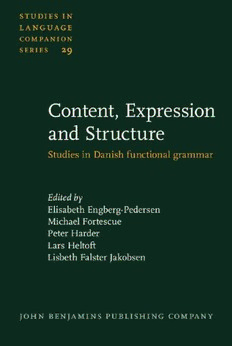
Content, Expression and Structure: Studies in Danish Functional Grammar PDF
527 Pages·1996·22.601 MB·English
Most books are stored in the elastic cloud where traffic is expensive. For this reason, we have a limit on daily download.
Preview Content, Expression and Structure: Studies in Danish Functional Grammar
Description:
This collection of papers offers an alternative to mainstream functional linguistics on two points. Especially American lingusitics, function and structure is often understood as being only a matter of linguistic form - or expression - as opposed to content. The book tries to illustrate why function and structure must be understood as mutually dependent on relation to language - and why the most interesting aspect of language structure is the way it structures the content side of language. In this, the book represents a reaffirmation of traditional concerns in structural linguistics, especially with respect to the structural integrity of individual languages - but with a reversal of traditional priority: structure is not autonomous, but must be understood on the basis of function. Without being hostile to typological and universal generalizations, the articles suggest that similarities between languages can only be discussed on the basis of an understanding that includes a respect for language differences.
See more
The list of books you might like
Most books are stored in the elastic cloud where traffic is expensive. For this reason, we have a limit on daily download.
